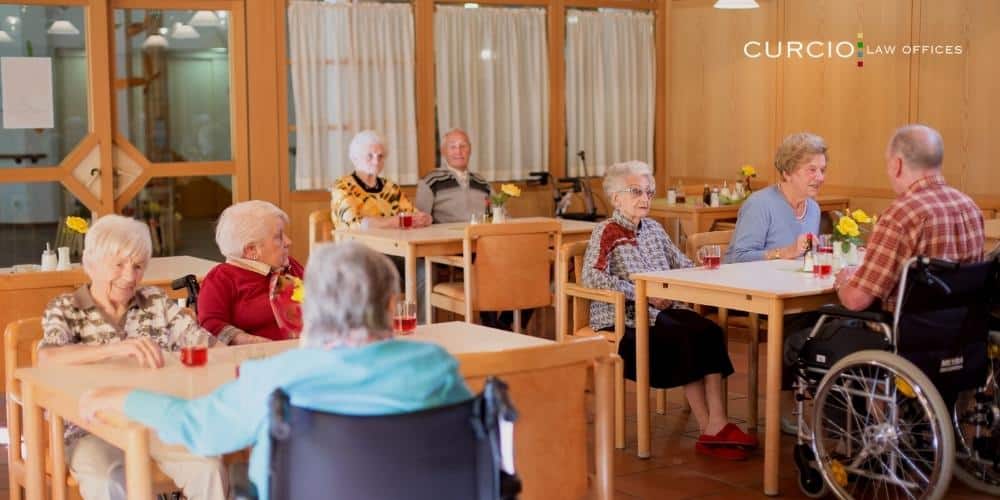CHICAGO NURSING HOME MALNUTIRITION LAWYERS
PRACTICE AREAS
Chicago Nursing Home Malnutrition Lawyer
There are approximately 1.5 million nursing home residents in the U.S. according to the Centers for Disease Control and Prevention (CDC). According to many studies, more than half of these residents suffer from malnutrition in nursing homes. Poor nutritional status is one of many signs of nursing home abuse that can lead to overall health deterioration and poor quality of life. If this sounds like your elderly loved one’s current situation, you could sue for elder abuse and neglect.
Curcio & Casciato is home to Chicago’s best nursing home abuse lawyers. Our Chicago personal injury lawyers are passionate about fighting for our elders in nursing homes because many of them are completely defenseless.
For more information on how a Chicago elderly abuse attorney can help you and your elderly loved one, call 312-321-1111 today.

What is Malnutrition?
Malnutrition occurs when the body doesn’t have enough nutrients to thrive or when there’s a major imbalance of micro and macro nutrients in the body. Having too little or too many nutrients in the body can lead to major health consequences, especially among nursing home residents.
Types of Malnutrition
There are two main types of malnutrition: undernutrition and overnutrition.
Undernutrition is what most people think of when they hear the term “malnutrition.” This means that a person isn’t receiving enough micronutrients (vitamins and minerals) and macronutrients (carbohydrates, fats, and proteins). Both macro and micronutrient deficiencies cause major stress on the body by forcing it to shut down some of its nonessential functions in order to stay alive.
Undernutrition is caused by inadequate food intake, nutrient absorption issues in the body, or eating too many foods with zero nutritional value. People think that only very thin people are undernourished. But morbidly obese people can be very malnourished too.
Overnutrition occurs when a person eats way too many micro or macro nutrients. Many people think that eating as many micronutrients as possible could never cause health issues in the body, but this isn’t true. Overdosing on vitamins and minerals could lead to major nutrient imbalances and cause issues like stomach cramps, diarrhea, hair loss, fatigue, nerve damage, etc. Micronutrient overdose is more rare than macronutrient overdose.
When a person eats too many macronutrients, the body will store them as fat. This can lead to morbid obesity and a host of other noncommunicable diseases (NCD) like coronary artery disease, stroke, high blood pressure, diabetes, etc.
It's important that nursing facilities follow the diabetes nursing care plan carefully.
Types of People Who Have a High Risk of Undernutrition
The types of people who are more likely to suffer from undernutrition include:
- Hospitalized older adults and nursing home residents
- People who have eating disorders such as anorexia-nervosa or bulimia
- Children who have limited access to healthy food
- People who suffer from chronic diseases that can prevent them from eating enough or prevent them from absorbing nutrients properly
- People who have limited income and resources
- Those who struggle with gastrointestinal issues such as lack of appetite, frequent nausea, bloating, and diarrhea
- Pregnant women who have severe morning sickness
Types of People Who Have a High Risk of Overnutrition
The types of people who are at a heightened risk of suffering from overnutrition include:
- People who are sedentary due to their job, their health, their family obligations, etc.
- Those who have limited income and can only afford fast foods (which have lots of calories and fat but little to no micronutrients)
- People who have eating disorders such as binge eating disorder or orthorexia (an obsession with eating extremely healthy foods)
Signs and Symptoms of Malnutrition
Common signs and symptoms of malnutrition in the elderly population include:
- Unintentional weight loss
- Muscle weakness
- Dizziness
- Chronic fatigue
- Shaking
- Water-electrolyte imbalance
- Weakened immune system which can cause frequent infections and illnesses
- Failure to thrive
- Mental health conditions including depression and anxiety
- Brain fog
- Hair loss
- Thin, pale, dry, hyperpigmented, cracked, or excessively wrinkled skin
- Gastrointestinal issues like loss of appetite, bloating, nausea, diarrhea, or constipation
- Low body temperature
- Low blood pressure and heart rate
- Swelling due to fluid retention (edema)
Meanwhile, the most common signs and symptoms of overnutrition can include obesity, heart disease, diabetes, and high blood pressure. If your loved one suffers from frequent infections, contact a Chicago nursing home infection lawyer at Curcio & Casciato. Our firm has Chicago MRSA lawyers, Chicago nursing home sepsis attorneys, and Chicago nursing home UTI lawyers on staff who can help!
How Common is Malnutrition in Nursing Homes?
Unfortunately, many nursing home residents face malnutrition, which can lead to a host of health problems. Recent studies claim that up to 60% of the elderly population in nursing home facilities, hospitals, and long-term care facilities suffer from malnutrition. Additionally, this study estimates that many elderly people in long-term care facilities eat less than 1,000 calories on a daily basis.

Why Do Elderly People Struggle With Malnutrition?
A variety of factors contribute to malnutrition in the elderly including physical, mental, and social issues.
One of the physical factors that can cause malnutrition in the elderly is just advanced age. Aging can cause someone to generally lose interest in food and eating. Loss of interest in food naturally leads to poor eating habits. Other physical factors that can lead to malnutrition are:
- Certain medications which can cause decreased appetite, nutrient absorption issues, gastrointestinal issues, etc.
- Poor dental health which can make it difficult or painful to chew solid foods
- General weakness, shakiness, and fatigue which can make it difficult for elderly people to feed themselves with silverware
- Chronic diseases which can cause inflammation, decreased appetite, gastrointestinal issues, nutrient absorption issues, etc.
- Medical conditions that may be partially treated with dietary restrictions
- Changes in taste or smell which can impact appetite
- Dysphagia, which is basically difficulty swallowing
Unstable mental health in nursing homes can contribute to malnutrition in nursing homes including dementia or Alzheimer’s disease, depression, Relocation Stress Syndrome, or some other cognitive impairment. Elderly people who struggle with memory and cognitive impairment can forget to eat without frequent reminders from the nursing staff. Additionally, depression and malnutrition often go hand in hand. Malnutrition can cause depression, and depression can cause malnutrition. Elderly people who are depressed may not have an appetite or may refuse to eat.
Social issues in nursing homes, such as social isolation, can also affect malnutrition. Socializing every day with other residents or family members is crucial for physical and mental health in nursing facilities. Unfortunately, many older adults in nursing homes don’t socialize often enough due to their medical conditions and mobility issues.
Additionally, nursing home abuse and neglect is prevalent in the United States. Daily neglect from nursing staff can prevent residents from receiving help to get up, socialize, and go to the cafeteria, for example. Nursing home neglect can also result in staff members just not feeding their residents in a timely manner. Some residents even suffer verbal abuse from nursing home employees. All of these social factors can lead to depression, which can then lead to malnutrition.
Health Problems Caused By Malnutrition in Nursing Homes
Proper nutrition is crucial for good health, especially in old age. Many of the chronic conditions and infections that nursing home residents suffer from are exacerbated by a poor nutritional status. Without good nutrition, older adults in nursing homes can suffer adverse effects such as:
- An incredibly weak immune system (older adults already have weak immune systems due to advanced age)
- Unintentional weight loss, muscle loss, and bone loss
- Frequent infections and wounds that struggle to heal like bedsores, MRSA skin infections, UTIs, etc.
- Frequent illnesses such as respiratory infections, COVID-19, stomach bugs, etc.
- Poor oral health such as weak or missing teeth, sensitive gums, and canker sores
- Weakness, shakiness, and fatigue
- A much shorter lifespan
Treating Malnutrition in Nursing Homes
Treating malnutrition in nursing homes often requires a physical, mental, and social approach. In order to promote good nutrition, nursing home staff members should:
- Remove or modify dietary restrictions if they’re making the patient struggle to eat enough.
- Add nutritional supplements into a patient’s daily diet (such as nutritional shakes, protein powder, multi vitamins, etc.)
- Ensure residents eat as much protein as possible.
- Offer smaller, more frequent meals and snacks instead of 3 large meals a day.
- Check patients for dysphagia. If they have dysphagia, make sure they eat soft foods, liquid foods, or small bites of food.
- Treat depression with antidepressants that don’t affect appetite.
- Encourage social activities and light exercise which can also help with depression.
- Replace certain medications that cause lack of appetite or gastrointestinal issues.
- Offer flavor enhancers for food and water.
- Help patients eat with silverware if they’re struggling to pick it up on their own.
- Create the best possible sensory eating experience by ensuring that patients have their glasses, hearing aids, dentures, etc.
- Encourage eating in the cafeteria with other residents. This social factor could help depression and appetite.
- Ensure that the patient is sitting up straight, especially if they struggle to swallow. This could prevent choking.
- Encourage family members to visit residents as frequently as possible, maybe even during meal times.
Is Malnutrition a Sign of Nursing Home Abuse and Neglect?
Yes, elderly malnutrition can certainly be a sign of nursing home abuse and neglect. Staff members who simply fail to feed their immobile, depressed, or mentally/physically ill patients are engaging in both abuse and neglect. Additionally, not taking every measure possible to help residents consume good nutrition in order to maintain optimum health is considered abusive and neglectful.
It’s natural for appetite to decrease as we get older, more frail, and more sick. But nursing homes are fully responsible for promoting the best health and wellbeing possible for their residents. If they fail to do this in any way, which causes major health consequences for the resident, they could face elder abuse lawsuits.
If your elderly loved one’s mental or physical health is suffering due to malnutrition, you may have grounds to pursue legal action. Chicago’s top elder abuse attorneys at Curcio & Casciato will listen to your loved one’s situation, help you determine the best course of action, and help you gather sufficient evidence to prove that the malnutrition is caused by nursing home abuse and neglect.

Call Chicago Elder Abuse Attorneys at Curcio & Casciato Today
If your elderly loved one is suffering from malnutrition and other health consequences at their assisted living facility or nursing home, you need strong legal representation. No one should have to suffer at the hands of their caretakers, especially our elderly population. Chicago elder abuse attorneys at Curcio & Casciato can help you recover damages on behalf of your loved one such as medical bills, pain and suffering, emotional distress, loss of quality of life, and more. Call us today at 312-321-1111 to schedule a free consultation.


